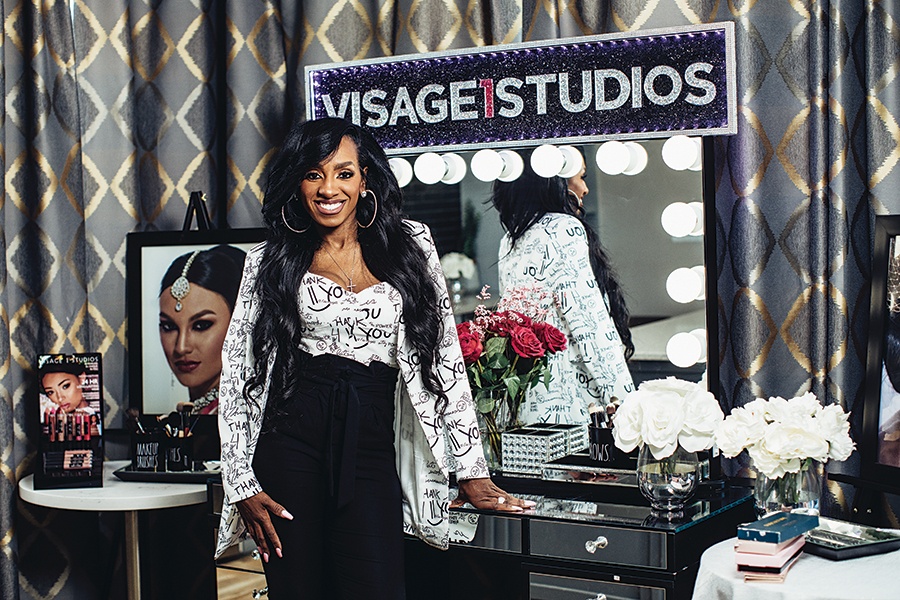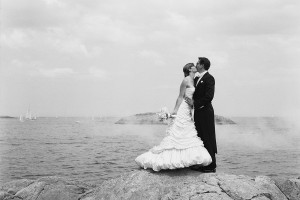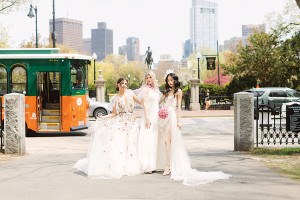Makeup Artist Joanna Petit-Frere Makes Every Bride Look Beautiful
With a brush and mascara in hand, Joanna Petit-Frere brings the best of beauty to your big day.

Photo by Sasha Israel
Even before graduating from MassArt with a degree in photography, Joanna Petit-Frere was well on her way to becoming a fixture on the Boston makeup scene. She began freelancing in college and, two years in, decided to open Visage 1 Studios in 2003, with the goal of cultivating a place where everyone can look beautiful. Though she gave up the studio space during the pandemic, her work is still going strong. “I’m kind of the final touch,” says Petit-Frere, who specializes in makeup for all ethnicities. “Most of the time when the brides are in my chair, they’re nervous, and I have to coach them through it. I take it very seriously, to make sure they’re relaxed, calm, and feeling beautiful.”
What looks are trending for brides right now?
A lot of brides ask for a champagne kind of shadow, like a natural foundation with blush, the shadow, and usually a liner on top—champagne usually goes with all skin tones. Brides now are doing very full, feathery brows; liners are more smudged, as opposed to that solid line; and kind of highlight-y, very natural palettes are popular, dewy or matte, depending on the person’s skin type. I consider myself a soft-glam makeup artist because I like to bring out people’s natural features, so they still look like themselves. That’s what I try to encourage a bride to do, because clean makeup is timeless.
How can a bride make sure she likes her look?
[During the trial], I tell them, “If you don’t like this, it doesn’t hurt my feelings.” It’s hard for me to go back once we build a certain step, so don’t be afraid to say what you like or you don’t like. This is your day! You want to enjoy this moment, so don’t let other people steer your decisions. I do this thing now where I give [brides] the mirror and literally talk through the whole look so we’re in agreement on all the steps. After, I take a picture, and I send [it to the bride] and say, “This is what you look like after the trial. Let me know if you want any changes.”
At what point in the day-of prep should brides get their makeup done?
I do the bride second to last or third to last, based [on] the time that the photographer comes in. All the vendors are pressed for time, so I like to tell them my schedule because I know how it’s going to fall into place. When the photographer comes, you have to be done. When they take pictures of, for example, you putting on your lipstick, you want your face, your hair, everything to be on point, and then the pictures are just of you doing little touchups. You have to align it with the photographer, videographer, and coordinator. I’ll touch base with the photographer—What time are they working with? What’s the concept?—because I want to make sure it flows. I want to be a part of making sure the vision comes together.
What guidance do you have for a bride who doesn’t usually wear makeup?
Often, this is the first time a bride gets professional makeup done. Usually, when a bride contacts me, I tell them to send me a picture of how they want their makeup. I’m assessing the picture, seeing the look that she wants me to achieve. During the trial, I bring them through the process. I’m feeling out their energy, feeling out their personality with the makeup. Sometimes people don’t understand, so I have to educate them about makeup a little bit when they’re in my chair. I’m like, “Yup, I’m doing this technique because….. I’m doing that technique because….” I have a teaching spirit. I
like people to feel empowered with their beauty.
How do you advise brides who think they can simply follow their usual beauty routine for their wedding?
This isn’t everyday makeup. It needs to be long-lasting, photograph well, and withstand the weather all day. I tell them, “Your face has to match your attire.” It looks over-the-top—until you put everything else on.
Tips
A makeup trial can be almost as daunting as the wedding itself. Check out Joanna Petit-Frere’s pointers for the ultimate “Me Day.”
Book Ahead
Make an appointment as soon as you know the wedding date. Makeup artists can book out a year, sometimes two, in advance.
Time It Right
Schedule the trial at the same time as another wedding-related event, such as an engagement shot, a dress-fitting, or a hair trial. This way, you get a chance to see the whole look together before you walk down the aisle.
Find Your Likeness
When you send inspiration pictures to the makeup artist before the trial, make sure that the person in the picture has a similar skin tone and features to your own. Certain makeup looks different on different features.
Getting married? Start and end your wedding planning journey with Boston Weddings' guide to the best wedding vendors in the city.


